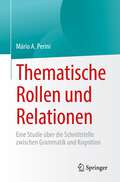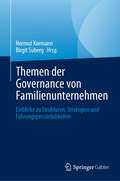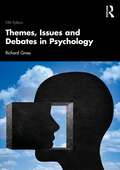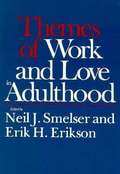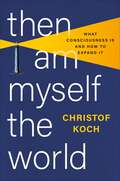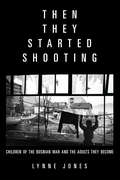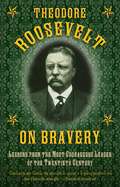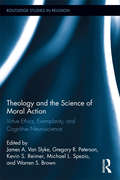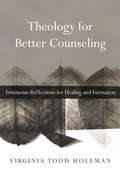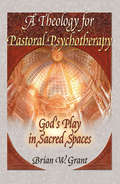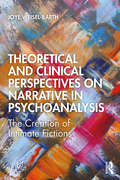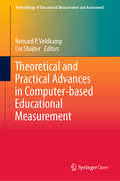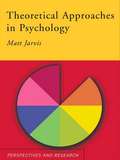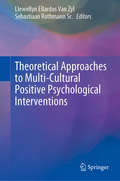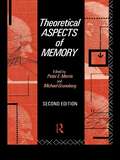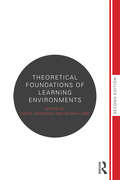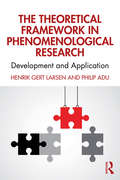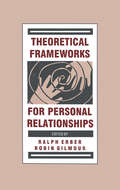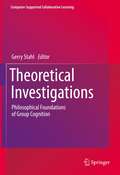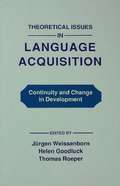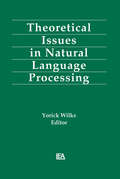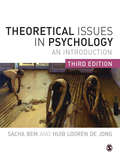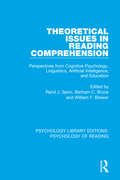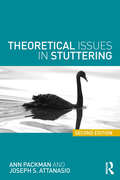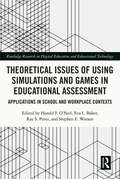- Table View
- List View
Thematische Rollen und Relationen: Eine Studie über die Schnittstelle zwischen Grammatik und Kognition
by Mário A. PeriniDieses Buch präsentiert einen Vorschlag zur besseren Definition thematischer Beziehungen, indem es die Beziehung zwischen Sprache und Kognition untersucht. Es analysiert die Beziehung zwischen grammatisch definierten Rollen wie Agent und Patient (semantische Rollen) und elaborierten thematischen Relationen (ETRs), die den Sprachbenutzern tatsächlich zugänglich sind. Es wird gezeigt, dass viele Phänomene, die zuvor als grammatikalisch analysiert wurden, auf einfachere und bequemere Weise beschrieben werden können, indem eine direkte Verbindung zwischen syntaktischen Ergänzungen und kognitiven Beziehungen, die in dem durch das Verb hervorgerufenen Schema vorhanden sind, postuliert wird. Der Band konzentriert sich auf ein Thema, das in der jüngeren Literatur viel diskutiert wurde, nämlich die Definition und Abgrenzung semantischer Rollen, und schlägt neue Lösungen für einige wichtige theoretische und praktische Probleme bei der Beschreibung der lexikogrammatischen Struktur von Sprachen und insbesondere der Verbvalenz vor. Es wird gezeigt, dass in vielen Fällen eine direkte Beziehung zwischen morphosyntaktischen Einheiten und Funktionen einerseits und ETRs andererseits hergestellt werden kann, ohne die Vermittlung von grammatisch definierten semantischen Rollen. Dadurch wird es möglich, traditionell problematische thematische Relationen, wie z.B. den Patienten, auf linguistisch einfache und kognitiv gut motivierte Weise zu analysieren. Thematische Beziehungen - Eine Studie über die Schnittstelle zwischen Grammatik und Kognition ist ein nützliches Hilfsmittel für Linguisten, die sich mit der Analyse natürlicher Sprachen beschäftigen, insbesondere mit der Valenz von Verben, der Subkategorisierung von Verben und der thematischen Struktur, den semantischen (thematischen) Rollen, ihrer Definition und syntaktischen Kodierung, der Beziehung zwischen grammatischer Struktur und kognitiven Schemata (Frames) und der Struktur des Lexikons.
Themen der Governance von Familienunternehmen: Einblicke zu Strukturen, Strategien und Führungspersönlichkeiten
by Hermut Kormann Birgit SubergDieses Buch konzentriert sich auf die Rolle des Beirats oder ähnlicher Governance-Gremien in Familienunternehmen und speziell auf Prozesse und Themen von strategischer Bedeutung. Es umfasst alle relevanten Themen, die regelmäßig behandelt werden müssen, wie Strategieentwicklung, Finanzmanagement und Führung. Zu jedem Thema werden die Vor- und Nachteile herausgearbeitet. Dies ist eines der wenigen Bücher, das sich mit Familienunternehmen befasst, von den Governance-Systemen bis hin zur Rolle der Führungskräfte. Die von den Autoren sorgfältig gesammelten Beispiele und die eingehende Diskussion der Themen bieten dem Leser wertvolle Einblicke, um die Wirksamkeit der Unternehmensführung zu bereichern.
Themes, Issues and Debates in Psychology
by Richard GrossThemes, Issues and Debates in Psychology presents an integrated view of Psychology by identifying underlying themes (such as the scientific nature of Psychology, cultural and gender differences), issues (ethical, methodological and conceptual), and debates (such as heredity vs. environment, free will vs. determinism, normality vs. abnormality) which permeate the discipline as a whole. The text adopts a critical approach to ‘mainstream Psychology’, attempting to identify and challenge some of the underlying assumptions that are traditionally made about ‘human nature’ and how it can be investigated in ways based on the scientific study of the natural world. What makes Psychology unique is the view of Psychologists as part of their own subject-matter: trying to study other people cannot be done by copying the methods of the physicist or chemist. Psychology draws on and brings together a number of different theories and methodologies from a wide range of other disciplines, including philosophy, biology, anthropology and sociology. Themes, Issues and Debates in Psychology also includes chapters on Parapsychology, Positive Psychology and Religion and Spirituality, which are rarely found together in a single text. Not only are these not mainstream, but they highlight some of the themes, issues and debates discussed in earlier chapters. The topics in this fifth edition of this book are inflected by a new concern with decolonizing the curriculum, and discussions of cultural and gender-based issues are integrated into all aspects of the text to offer a new and critical perspective on issues such as political and scientific colonialism. Additionally, the text features ‘Question Time’ breaks that relate to methodological, theoretical and other issues; these are all aimed at helping the reader assimilate the material. Some of the issues raised could form the basis of seminar papers/discussions. Themes, Issues and Debates in Psychology is ideal reading for all students and is relevant to undergraduate courses in psychology.
Themes of Work and Love in Adulthood
by Erik H. Erikson Neil J. SmelserTo love and to work, Freud's famous definition of psychological maturity becomes the focusing principle for renewed examination of dominant themes that play themselves in adult life. Leading experts explore the states and crises adults pass through.
Then I Am Myself the World: What Consciousness Is and How to Expand It
by Christof Koch"Deeply personal and infinitely digestible, Then I Am Myself the World is a remarkable must-read for anyone interested in knowing their mind.&”―Judson Brewer MD, PhD, New York Times–bestselling author of Unwinding Anxiety The world&’s leading investigator of consciousness argues that by understanding what consciousness does—cause change in the world—we can understand its origins and its future In Then I Am Myself the World, Christof Koch explores the only thing we directly experience: consciousness. At the book&’s heart is integrated-information theory, the idea that the essence of consciousness is the ability to exert causal power over itself, to be an agent of change. Koch investigates the physical origins of consciousness in the brain and how this knowledge can be used to measure consciousness in natural and artificial systems. Enabled by such tools, Koch reveals when and where consciousness exists, and uses that knowledge to confront major social and scientific questions: When does a fetus first become self-aware? Can psychedelic and mystical experiences transform lives? What happens to consciousness in near-death experiences? Why will generative AI ultimately be able to do the very thing we can do, yet never feel any of it? And do our experiences reveal a single, objective reality? This is an essential book for anyone who seeks to understand ourselves and the future we are creating.
Then They Started Shooting
by Lynne Jones"Remarkable insight and sensitivity . . . deepen[s] our understanding of human resilience and how people rebuild their lives from tragic circumstances." -KENNETH ROTH, Executive Director, Human Rights Watch"The stories in this book are eloquently and poignantly recounted, and offer a vital, complex portrait of what the long road to peace looks like." -DINAW MENGESTU, author of The Beautiful Things That Heaven Bears and How to Read the Air"Profound . . . Rarely do we get the opportunity to delve into the thoughts of the young caught up in such a tragedy-and meet them not just once in their lives but again years later." -TIM JUDAH, Europe correspondent for Bloomberg World View, Balkans correspondent for The Economist, and author of The Serbs: History, Myth and the Destruction of YugoslaviaImagine you are nine years old. Your best friend's father is arrested, half your classmates disappear from school, and someone burns down the house across the road. Imagine you are ten years old and have to cross a snow-covered mountain range at night in order to escape the soldiers who are trying to kill you. How would you deal with these memories five, ten, or twenty years later once you are an adult?Jones, a relief worker and child psychiatrist, interviewed over forty Serb and Muslim children who came of age during the Bosnian War and now returns, twenty years after the war began, to discover the adults they have become. A must-read for anyone interested in human rights, children's issues, and the psychological fallout from war, this engaging book addresses the continuing debate about PTSD, the roots of ethnic identity and nationalism, the sources of global conflict, the best paths toward peacemaking and reconciliation, and the resilience of the human spirit.Lynne Jones was appointed an Officer of the Order of the British Empire for her work in child psychiatry in conflict-affected areas of Central Europe and has established and directed mental health programs in areas of conflict and natural disaster throughout Latin America, the Balkans, East and West Africa, the Middle East, and Southeast Asia. Her field diaries have been published in O, The Oprah Magazine and London Review of Books, and her audio diaries have been broadcast on the BBC World Service.
Theodore Roosevelt on Bravery: Lessons from the Most Courageous Leader of the Twentieth Century
by Theodore RooseveltTeddy Roosevelt is the only president in history to deliver a ninety-minute speech directly after being shot in the chest. He’s a Nobel Prize recipient, a Harvard graduate, and he was the youngest President in history to be inaugurated into office. Roosevelt’s force took America by storm in the early twentieth century, and he is regarded as one of the finest leaders ever to take office. His wisdom even earned him a spot in Mount Rushmore, which has immortalized him along with George Washington, Thomas Jefferson, and Abraham Lincoln. As a sickly child, Roosevelt was home-schooled his entire life until enrolling at Harvard University, where he studied biology. A year after graduating, he began his political career as the New York City police commissioner, and later as a member of the New York State Assembly, where he led the reform division of the GOP. In the time since his presidency, Roosevelt’s bravery has inspired generations of Americans. "A man who is good enough to shed his blood for the country is good enough to be given a square deal afterwards. ” Skyhorse Publishing, as well as our Arcade imprint, are proud to publish a broad range of books for readers interested in history--books about World War II, the Third Reich, Hitler and his henchmen, the JFK assassination, conspiracies, the American Civil War, the American Revolution, gladiators, Vikings, ancient Rome, medieval times, the old West, and much more. While not every title we publish becomes a New York Times bestseller or a national bestseller, we are committed to books on subjects that are sometimes overlooked and to authors whose work might not otherwise find a home.
Theology and the Science of Moral Action: Virtue Ethics, Exemplarity, and Cognitive Neuroscience (Routledge Studies in Religion)
by Warren S. Brown Kevin S. Reimer James A. Van Slyke Gregory R. Peterson Michael L. SpezioThe past decade has witnessed a renaissance in scientific approaches to the study of morality. Once understood to be the domain of moral psychology, the newer approach to morality is largely interdisciplinary, driven in no small part by developments in behavioural economics and evolutionary biology, as well as advances in neuroscientific imaging capabilities, among other fields. To date, scientists studying moral cognition and behaviour have paid little attention to virtue theory, while virtue theorists have yet to acknowledge the new research results emerging from the new science of morality. Theology and the Science of Moral Action explores a new approach to ethical thinking that promotes dialogue and integration between recent research in the scientific study of moral cognition and behaviour—including neuroscience, moral psychology, and behavioural economics—and virtue theoretic approaches to ethics in both philosophy and theology. More particularly, the book evaluates the concept of moral exemplarity and its significance in philosophical and theological ethics as well as for ongoing research programs in the cognitive sciences.
Theology for Better Counseling: Trinitarian Reflections for Healing and Formation (Christian Association for Psychological Studies Books)
by Virginia Todd HolemanAt one time, Virginia Todd Holeman "Toddy" thought being biblically literate was all she needed and had little interest in what real theologians talked about. But in her counseling she found that clients pressed her for more. They didn't just want what she had gained through training in the best theories and practices available for counseling. They asked hard theological questions often related to their suffering. As she describes it, they experienced a kind of "theological disequilibrium . . . which left them discouraged, disoriented and often distraught." Holeman shows how deep and clear theological reflection can make a major difference in counseling practice. Not only can it shape who we are, it can also bring into greater alignment our theological commitments, our therapeutic practices and our professional ethics. All the while it can have the most practical effect on our counseling sessions. In this volume Holeman guides counseling students, pastoral counselors and licensed mental health professionals into becoming as well-formed theologically as they are trained clinically.
A Theology for Pastoral Psychotherapy: God's Play in Sacred Spaces
by Brian Grant Richard L DayringerThe role of the pastoral psychotherapist requires balance between the individual, the community, and God. Are you ready to take on this challenge?This unique book examines the role of pastoral psychotherapy as it relates to the individual, the community, and God, and describes the process of pastoral psychotherapy in detail. It identifies healing as a mark of God's activity, and then shows how God, through healing, creates communities that ultimately shape the selves and personalities within them. Pastoral psychotherapy is a sanctified act taking place in a sanctified space. It occurs in “sacred space” as defined/created/hallowed by God, the community, the therapist, and the client. The delineating of this sanctified holy space separates what goes on in therapy from the secular, ordinary processes of life. A Theology for Pastoral Psychotherapy: God's Play in Sacred Spaces finds God in the creation of each sacred space. Pastoral psychotherapy has developed as a means of enabling individuals and communities to cope with the ills of the modern age. It addresses sin and evil in today's world, changing the way that clients relate to people, ideas, and events in their communities, families, and individual psyches. A Theology for Pastoral Psychotherapy: God's Play in Sacred Spaces describes the process of psychotherapy from a theological point of view. It shows how God hallows sacred spaces and explores the power of God to stimulate the search for healing. A Theology for Pastoral Psychotherapy: God's Play in Sacred Spaces: explores the sharing of selves as presented by theorists on intersubjectivity identifies the creation of the therapy dyad in the work of the Holy Spirit, drawing on new trinitarian theology explores ways in which therapy both is and is not an extension of the work of Christ shows how God lures us toward spiritual growth links psychoanalysis to the mystical disciplines, interweaving mystical Christianity, object-relations view of psychoanalysis, and process theologyBased on the theories of Bion, Klein, Winicott, Bollas, and Whitehead, A Theology for Pastoral Psychotherapy: God's Play in Sacred Spaces is an in-depth examination of the intricate interplay of God, community, the individual, and the therapist in pastoral psychotherapy. at www.HaworthPress.com.
Theoretical and Clinical Perspectives on Narrative in Psychoanalysis: The Creation of Intimate Fictions
by Joye Weisel-BarthThis book is of and about psychoanalytic stories. It describes the personal, theoretical, and cultural stories that patients and analysts bring, create, and modify in analytic work. It shows how the joint creation of new life narratives over time results in transformed senses of self and relationship. Flowing from the tradition of narrative theory, these stories seek to recast the creation of analytic narratives in social contexts and contemporary relational theories. They depict ongoing therapeutic process and heightened interactive events and moments that together expand personal scope and change life directions for both partners in the analytic dyad. Its stories illuminate sometimes difficult and arcane analytic theory, bringing the meanings and utility of theory into living action. They also show how familiar emotions such as love, hate, envy, and loneliness, and active human values such as empathy, generosity, and good faith function in psychoanalytic interaction. In short, these analytic stories are useful teaching tools. The narrative tales in this book address a wide range of history and emotions in both patients and analyst. The patients, fictionalized characters from a lifetime of analytic practice, are protagonists with backgrounds of trauma, loss, relational and geographical dislocation, but also successful adaptations and struggle toward self-development. Some of their stories describe intense short-term work and others long-term analytic relationships. The subjective experience and responses of the analyst are also central parts of the analytic fictions. The book will be invaluable to readers curious about psychoanalysis, for therapists, and especially for teachers of therapeutic issues and process.
Theoretical and Practical Advances in Computer-based Educational Measurement (Methodology of Educational Measurement and Assessment)
by Bernard P. Veldkamp Cor SluijterThis open access book presents a large number of innovations in the world of operational testing. It brings together different but related areas and provides insight in their possibilities, their advantages and drawbacks. The book not only addresses improvements in the quality of educational measurement, innovations in (inter)national large scale assessments, but also several advances in psychometrics and improvements in computerized adaptive testing, and it also offers examples on the impact of new technology in assessment. Due to its nature, the book will appeal to a broad audience within the educational measurement community. It contributes to both theoretical knowledge and also pays attention to practical implementation of innovations in testing technology.
Theoretical Approaches in Psychology
by Matt JarvisPsychologists use a range of principles and theories, all of which view the person and the study of the person in very different ways. Theoretical Approaches in Psychology introduces and outlines the six main approaches and considers how each has helped psychologists understand human behaviour, thought and feeling. The Routledge Modular Psychology series is a completely new approach to introductory level psychology, tailor-made for the new modular style of teaching. Each book covers a topic in more detail than any large textbook can, allowing teacher and student to select material exactly to suit any particular course or project. Especially written for those students new to higher-level study, whether at school, college or university, the books include the following designed features to help with technique: Practice essays with specialist commentary to show how to achieve a higher grade Chapter summaries and summaries of key research Glossary and further reading Progress and review exercises.
Theoretical Approaches to Multi-Cultural Positive Psychological Interventions
by Llewellyn Ellardus Van Zyl Sebastiaan RothmannThis volume provides theoretical perspectives on and approaches to the development or enhancement of positive psychological capacities within various multi-cultural professional and organizational contexts. Specifically, it presents theoretical frameworks for the identification, development and optimization of positive psychological capacities through a contemporary, multi-cultural and multi-disciplinary lens. In recent years, the applicability of positive psychological intervention (PPI) techniques has transposed the boundaries of clinical practice into a wide array of complementary domains such as law, education, business and even design sciences such as architecture. These interventions target the enhancement of positive psychological capacities (e.g. strength-identification and use; high-performance learning; appreciative design; job-crafting) in order to not only improve individual functioning, well-being and the treatment of various forms of psychopathology but also to enhance team functioning/performance, organizational growth and community development. Despite its importance, very little research has been done on the design of PPIs applicable to multi-cultural contexts. The contributions to this volume provide insights into this hitherto neglected area of research.
Theoretical Aspects of Memory: Volume 2
by Michael Gruneberg Peter E MorrisRecent years have seen major developments in our understanding of how memories works. Aspects of Memory gives a clear introduction by some of the world's leading experts. The first two chapters of set past theorising about memory in an historical context and identify the major aspects of memory to be captured by any theoretical account. Later chapters go on to discuss theoretical accounts of working memory, the development of memory, implicity memory, and context-dependent memory. A final section discusses the respective strengths and problems of naturalistic and laboratory research on memory.Aspects of Memory provides an excellent authoritative textbook of current approaches to memory.
Theoretical Foundations of Learning Environments
by Susan Land David JonassenTheoretical Foundations of Learning Environments provides students, faculty, and instructional designers with a clear, concise introduction to the major pedagogical and psychological theories and their implications for the design of new learning environments for schools, universities, or corporations. Leading experts describe the most important contemporary theories that form the foundation of the conception and design of student-centered learning environments and new applications of educational technologies. This book is well suited as a textbook for courses in instructional design, educational psychology, learning theory, curriculum theory and design, and related areas. The rise of constructivism and its associated theories represented a paradigm shift for educators and instructional designers to a view of learning as necessarily more social, conversational, and constructive than traditional transmissive views of learning. This bestselling book was the first to provide a manageable overview of the altered field, and the second edition has been fully updated to include expert introductions to Metacognition, Argumentation, and other key contemporary theories.
The Theoretical Framework in Phenomenological Research: Development and Application
by Henrik Gert Larsen Philip AduThe Theoretical Framework in Phenomenological Research: Development and Application is an introduction to phenomenology in which the authors overview its origin, main ideas and core concepts. They show the application and relevancy of phenomenological tenets in practical qualitative research, as well as demonstrate how aligning theory and method enhances research credibility. In this detailed but digestible explanation of phenomenological theories, the authors explore the ideas of the main founders pertaining to the meaning of perceived reality and the meaning of being, and how these founders articulated their methodologies. In doing so, The Theoretical Framework in Phenomenological Research fills the well-documented gap between theory and practice within phenomenology by providing a much-needed bridge between the foundational literature and applied research on the subject, focusing equally on theory and practice. The book includes practical demonstrations on how to create theoretical/conceptual frameworks in applied phenomenological research. It also features detailed, step-by-step illustrations and examples regarding how researchers can develop frameworks and use their concepts to inform the development of themes at the data analysis stage. A reliable guide underpinned by foundational phenomenology literature, The Theoretical Framework in Phenomenological Research is an essential text for researchers, instructors, practitioners and students looking to design and conduct phenomenological studies in a manner that ensures credible outcomes.
Theoretical Frameworks for Personal Relationships
by Robin Gilmour Ralph ErberThe past two decades have seen a tremendous increase in research and scholarship devoted to personal relationships. From rather scattered beginnings a recognizable and recognized field has emerged, whose strength and health is reflected in a wide array of indicators. The editors contend that while the vigor of the field is often shown in the diversity and innovation of its research, it is in the theoretical domain that they find evidence of a real coming of age. This volume provides grounds for arguing that the diversity of theorizing is particularly healthy at this point. The reader will notice that there is some diversity in terms of how much theory and research is contained in each chapter -- some are purely theoretical; others are complemented by original pieces of empirical research. The editors and contributors are from different countries -- another way in which the diversity of this book manifests itself. The variety of the frameworks presented are seen as a strength, as building on established strengths elsewhere to feed into relationship research and enhance its vitality. Each chapter makes its own contribution to thinking and research about personal relationships. As a group they add to an exciting collection that not only reflects a richness of conceptual backing, but also a wide range of usable theoretical structures.
Theoretical Investigations: Philosophical Foundations of Group Cognition (Computer-Supported Collaborative Learning Series #18)
by Gerry StahlComputers have transformed how we think, discuss and learn—as individuals, in groups, within cultures and globally. However, social media are problematic, fostering flaming, culture wars and fake news. This volume presents an alternative paradigm for computer support of group thinking, collaborative learning and joint knowledge construction. This requires expanding concepts of cognition to collectivities, like collaborative groups of networked students. Theoretical Investigations explores the conditions for group cognition, supplying a philosophical foundation for new models of pedagogy and methods to analyze group interaction. Twenty-five self-contained investigations document progress in research on computer-supported collaborative learning (CSCL)—both in Stahl’s own research and during the first decade of the CSCL journal.The volume begins with two new reflections on the vision and theory that result from this research. Representing both ethnomethodological and social-constructivist research paradigms, the investigations within this volume comprise a selection of seminal and influential articles and critical commentaries that contribute to an understanding of concepts and themes central to the CSCL field. The book elaborates an innovative theory of group cognition and substantiates the pedagogical potential of CSCL. Theoretical Investigations: Philosophical Foundations of Group Cognition is essential as a graduate text for courses in educational theory, instructional design, learning and networked technologies. The investigations will also appeal to researchers and practitioners in those areas.
Theoretical Issues in Language Acquisition: Continuity and Change in Development
by Jürgen Weissenborn Helen Goodluck Thomas RoeperIn recent linguistic theory, there has been an explosion of detailed studies of language variation. This volume applies such recent analyses to the study of child language, developing new approaches to change and variation in child grammars and revealing both early knowledge in several areas of grammar and a period of extended development in others. Topics dealt with include question formation, "subjectless" sentences, object gaps, rules for missing subject interpretation, passive sentences, rules for pronoun interpretation and argument structure. Leading developmental linguists and psycholinguists show how linguistic theory can help define and inform a theory of the dynamics of language development and its biological basis, meeting the growing need for such studies in programs in linguistics, psychology, and cognitive science.
Theoretical Issues in Natural Language Processing
by Yorick WilksAccompanying continued industrial production and sales of artificial intelligence and expert systems is the risk that difficult and resistant theoretical problems and issues will be ignored. The participants at the Third Tinlap Workshop, whose contributions are contained in Theoretical Issues in Natural Language Processing, remove that risk. They discuss and promote theoretical research on natural language processing, examinations of solutions to current problems, development of new theories, and representations of published literature on the subject. Discussions among these theoreticians in artificial intelligence, logic, psychology, philosophy, and linguistics draw a comprehensive, up-to-date picture of the natural language processing field.
Theoretical Issues in Psychology: An Introduction
by Dr Huib Looren De Jong Dr Sacha Bem"Bem and de Jong present complex ideas in an accessible manner. Theoretical Issues in Psychology gives undergraduate psychology students all the resources they need to begin reflecting on the most pressing conceptual issues in their discipline." - Stuart Wilson, Queen Margaret University The 3rd edition of Theoretical Issues in Psychology provides an authoritative overview of the conceptual issues in psychology which introduces the underlying philosophies that underpin them. It includes new insights across the philosophy of science combined with increased psychological coverage to show clearly how these two communities interrelate, ensuring an integrative understanding of the fundamental debates and how they link to your wider studies. Key features of this new edition include: Concise paragraphs, multiple examples and additional summaries throughout to help you focus on key areas of knowledge. Textboxes with definitions and key concepts to help your understanding of the main debates and ideas. New content on the philosophy of mind, philosophy of science, cognition and cognitive neuroscience. New up-to-date material on consciousness and evolutionary psychology. For lecturers and teachers, PowerPoint slides are available for each chapter. Sacha Bem & Huib Looren de Jong's textbook remains essential for students taking courses in conceptual and historical issues in psychology, the philosophy of psychology or theoretical psychology.
Theoretical Issues in Reading Comprehension: Perspectives from Cognitive Psychology, Linguistics, Artificial Intelligence and Education (Psychology Library Editions: Psychology of Reading #11)
by Rand J. Spiro, Bertram C. Bruce and William F. BrewerResearch in cognitive psychology, linguistics, and artificial intelligence – the three disciplines that have the most direct application to an understanding of the mental processes in reading – is presented in this multilevel work, originally published in 1980, that attempts to provide a systematic and scientific basis for understanding and building a comprehensive theory of reading comprehension. The major focus is on understanding the processes involved in the comprehension of written text. Underlying most of the contributions is the assumption that skilled reading comprehension requires a coordination of text with context in a way that goes far beyond simply chaining together the meanings of a string of decoded words. The topics discussed are divided into five general areas: Global Issues; Text Structure; Language, Knowledge of the World, and Inference; Effects of Prior Language Experience; and Comprehension Strategies and Facilitators, and represent a broad base of methodology and data that should be of interest not only to those concerned with the reading process, but also to basic science researchers in psychology, linguistics, artificial intelligence, and related disciplines.
Theoretical Issues in Stuttering
by Ann Packman Joseph S. AttanasioDespite decades of research into the nature and treatment of stuttering, the causes and underlying mechanisms of it are still not well understood. In this unique and comprehensive overview of the numerous theories and models which seek to understand and explain stuttering, the authors of Theoretical Issues in Stuttering provide an invaluable account. Covering an impressive range of topics including past and current theories of stuttering, this edition provides the reader with an updated evaluation of the literature on the subject of stuttering alongside exploring the evolution of new theories. Placing each within the relevant historical context, the authors explore the contribution of theory to both understanding and managing stuttering. Theoretical Issues in Stuttering is a critical account of the models and theories which surround the subject of stuttering, aiming to act as a key resource for students of speech-language pathology as well as lecturers, clinicians and researchers within the field.
Theoretical Issues of Using Simulations and Games in Educational Assessment: Applications in School and Workplace Contexts (Routledge Research in Digital Education and Educational Technology)
by Harold F. O'NeilPresenting original studies and rich conceptual analyses, this volume reports on theoretical issues involved in the use of simulations and games in educational assessment. Chapters consider how technologies can be used to effectively assess, modify, and enhance learning and assessment in education and training. By highlighting theoretical issues arising from the use of games and simulations as assessment tools for selection and classification, training, and evaluation across educational and workplace contexts, the volume offers both broad conceptual views on assessment, as well as rich descriptions of various, context-specific applications. Through a focus that includes both quantitative and qualitative approaches, policy implications, meta-analysis, and constructs, the volume highlights commonalities and divergence in theoretical research being conducted in relation to K-12, post-secondary, and military education and assessment. In doing so, the collection enhances understanding of how games and simulations can intersect with the science of learning to improve educational outcomes. Given its rigorous and multidisciplinary approach, this book will prove an indispensable resource for researchers and scholars in the fields of educational assessment and evaluation, educational technology, military psychology, and educational psychology.
